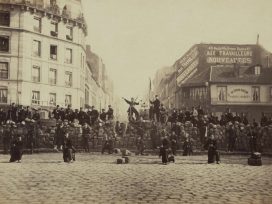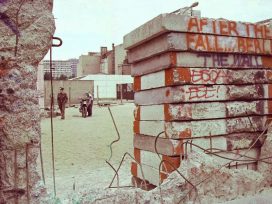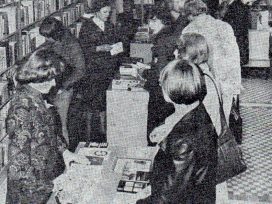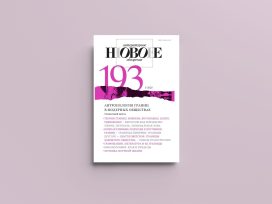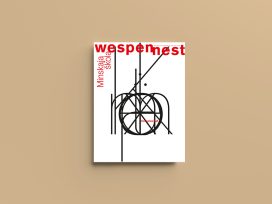It’s great when you get a whisper; you don’t have to think. Obviously, it depends who puts the whisper on. It’s rare for anything to occur to me off the cuff. A request came through that a special number of the journal Ex Symposion was taking shape on whispers about informing, and more specifically under the working title of “My buddy the grass”, and it turned out that I had trouble writing anything about that. Not that I didn’t have buddies who were grasses; or to be more precise, it had not come to light that any of my buddies had been a grass. Though it had turned out about one, and he wasn’t a close buddy, just a mate, and he hadn’t grassed on me; all he had grassed was that he had nothing to grass on, he put zilch down on paper, because word of mouth was not enough for them.
Zero morphemes.
Or does even that mean something to them?
So, he didn’t squeal anything, but he took even non-squealing to be squealing, and if one takes him at his word, I for one unhesitatingly believed him, by and large, on that; that is to say, he put his life on non-squealing. They put the screws on him through his dad. You’re eighteen, and they put the screws on you through your dad; that they’ll let him have it. No one put the screws on me through my dad. It now seems more than likely that they could have. Hands up anyone whom it’s a dead cert they couldn’t, not on your life, who’d be hanged if he would, a hundred to one.
That’s exactly when it comes to light, if it’s happened to you.
He came clean thirty years later.
Until then he’d kept it to himself, rotted away his life with it.
If something had presented a chance to pull out as they say, he would immediately think and how will it look if it’s screened.
You are screened just by living. In practice you screen yourself; you go around fully screened, and it’s not the golddarn silver-fir Sun that did it, but you arranged it, you put yourself on ice.
We are strolling in the street, some such cold day, we were going round a housing estate, he was apparently relieved, me in deep confusion; I should have squared matters with my tempers, only I had no tempers, there was no reason for me to be angry, because the whole thing was now over, it wasn’t possible to get angry at it; and as to the person who said he could not say anything, to be quite honest, what I felt inside was more a sort of tender feeling that was reminiscent of affection, as if I were talking with somebody who had got over a protracted serious illness, taking a stroll with some such person in the grounds of the sanatorium, gripping his elbow every now and then lest he topple over.
He rang me up to say he had something to tell me.
My thought was it must be graft, graft, more work to be done; how am I going to say no to an old mate.
We met at his workplace.
A fairly big dining-room, refectory, or whatever, with him sitting at the far end of the hall with a few colleagues, and the way he got to his feet, almost jumped up, when he spotted me, a seemingly exaggerated readiness to be of service, that was the only thing that struck me as odd. Like a nail sticking out of something totally smooth, like that.
“I saw a big-bodied fur animal from behind, its head twisted uncomfortably to the left as it looked fixedly at the morning star. The lacklustre tip of its nose was not real, nor was its pelt real, or the animal or the morning star; only the discomfort was real. Only the discomfort – that was real.”
The readiness to be of service was not real.
Or not what there had been up to that point, the whole thirty years.
There was something ghastly about him.
He had always been more than a touch supercilious on the odd occasions we had met during the thirty years in question; supercilious or phlegmatic, more phlegmatic, cool and phlegmatic, the grimaces he made while he spoke, looking slightly over your head. He had switched off that phlegmaticness, because he knew what he was going to say, what story he was going to come out with a few minutes from now; he had got past the decision to tell, and he was now free; it was a free man who got to his feet, he did not have to pretend any more, he could even allow himself to hurry.
What should I tell you.
I told him, as if I were praising him, phlegmatically, what he ought to have told them about me, what they were expecting from him was what, how big a danger, in meticulous detail, they had to defend the People’s Republic of Hungry from. They had asked him because they knew from the start; indeed, they knew more from the start than he could ever have known. Forget it, I told him. It wasn’t he who ought to be ashamed, but them for putting the screws on an eighteen-year-old kid through his dad.
Several people said, when it was the fashion to do it, why didn’t I ask to see the files, and I too had already given some thought to asking to see them; honest, a couple years ago I even had a plan to write a book about what sort of things had been reported back, of writing down just what my recollections were; or, to be more precise, weren’t. And that is precisely what would have been good about it, what with my memory being so catastrophically atrocious; maybe going through all that paperwork would have helped it a bit.
Don’t think of anything serious.
We nibbled Neapolitan biscuits with one hand.
Chuck them in front of the squirrels.
More a matter of the situations where you were sitting at a shindig, say in seventy-eight, or eighty-six, half a bottle of lousy wine in your hand, and you prattishly sound off that the regime can get stuffed. You read out a few bits of this and that, tuck a few cyclostyled sheets of paper in a letter box. Put your signature on something. You go somewhere you shouldn’t. And that’s all seen by somebody. He sees it then goes back home and writes up what it was you did. Writes it out on a sheet of paper, then hands it over to someone else. So I thought to myself, I can do that, there’ll come a time when I write down what the utterly hopeless, sodding country that we lived in really looked liked from the other side.
That reminds me. The day before yesterday I went to the Kossuth Square, to take a look at the Parliament building.
I wanted to go to Batthyány Square, but still a bit of time; I only needed to get out to Froggy Bottom for 8:15.
I would have a look, see who was there – what sorts of faces.
There was nothing special; I found what I had expected: a clueless middle-aged married couple in shabby overcoats, spotty neo-Nazis in Doc Martens, a few nutcases, slightly squiffy perpetual losers, fresh-faced high-school kids, a couple of homeless bums, then an acquaintance, or at least he seemed familiar, because he looked me straight in the eye and, a long way off, gave a smile like people do who, it turns out, are acquaintances, only I simply don’t remember who they are; well anyway, he was coming towards me in the crowd, there was a woman with him, and the fellow is more or less one of those intellectual types, close-cropped hair, greying beard, black polo neck, and, let’s say, a SzDSz sympathiser, a supporter of the Alliance of Free Democrats, not that I mean to suggest he was a Jew, just an old face from the glorious past, one of the Danube Circle or whatever. I thought to myself, obviously he has also come along to take a look, and now we’re going to have to swap views in choked voices, but his smile is increasingly odd, sneering or whatever, and he takes a broad swerve and moves off, so it looks like I won’t have to chat after all, a good job too, but what is not so good is that he ends up behind me, and he says to the woman, wonder how he got here, and then a few steps later, another sentence out of which all I understand is four-by-two. Like he said to her that I’m a four-by-two.
It did cross my mind for a second to kill him.
To turn, go after him, politely ask whether I had heard him right, then nut him in the face and, without paying any attention to the bloody red pulp where his nose had been, squeeze his windpipe until he ran out of puff.
Or I did, of course, because that too is on the cards.
I did nothing of the sort, though.
Someone was saying something about the theatre, utter tripe.
Then another started yelling into the microphone.
Did the bearded fellow really know me from somewhere, or had he seen me once on the telly; I could have been talking about some Jewish stuff. Maybe he just knew that people who are invited onto the telly, that’s what they all are. I mused as I set off back to the subway: Jewish therefore a Commie therefore a four-by-two – was that the algorithm.
What business indeed did I have here.
But then I’m a foreigner everywhere.
A homeless wretch.
A four-by-two.
One day, five years ago, I was called to the telephone in the Magyar Orange editorial office and a moderately confused but all the same, when it comes to it, resolute voice started to talk about screening in a barely comprehensible voice. I supposed he just had a goofy way of putting it: “A moving picture of various possibilities runs at lightning-quick speed through Auer’s brain. His uncle has arrived from America. The headmaster was calling him because there had been a staff meeting, and the teachers had finally agreed that Auer was a quite exceptional, unaccountable genius of the kind that the zeitgeist gives birth to just one in a century, and therefore he immediately had to grant him a school-leaving certificate plus a scholarship for one thousand crowns, accompanied by a big speech that the headmaster would deliver in the teachers’ common room. He is being called by the minister of education, who was at the staff meeting and had come expressly on his account, because someone had had passed on to him the latest essay that Auer had written for his Hungarian homework and it had just been read out, amidst copious tears, in the Houses of Parliament, and this government representative now wanted to shake hands with Auer. The drawing master was calling for him, because a wealthy patron of the arts had seen his sepia ‘Stylised leaf-shape’, and he wanted to purchase it for thirty thousand crowns to replace the City Park’s Feszty panorama that had just been auctioned off. I’ll give it him for twenty thousand, it suddenly struck Auer, panting as they reached the fourth floor,” yet lest there be any misunderstanding, the voice started to use the expression “implicated”, which rang a bell from newspaper articles. They had found me to be implicated, he said, and would I be so kind, be so kind as to go along to Hunter Street, at such-and-such a time, and bring any papers which had a bearing on my case, if I had any.
Like, what sort of papers, and on what case.
He had no way of knowing, and he couldn’t say anything.
And right then and there, on the telephone, I was a dumb enough arse to start explaining in an injured tone.
I shouldn’t get worked up; you never know, in the end they might want to give me a medal.
It was hard to decide if he was seriously trying to set my mind at rest or just taking the piss.
I put the phone down and sat back.
The magazine was just going to press. But I couldn’t work.
Suspicion would not allow me to work.
What if I couldn’t remember.
If I had been arrested once and made to sign something.
And I had forgotten, because it was best that way; they had nothing on me, I had not reported anything, I was quite sure of that, because if I’d blabbed and written reports, even just one, obviously I wouldn’t forget that. Ten years on from the last time I’d seen her, I met up with the girl with whom I had been desperately in love at the age of ten. Apparently she knew nothing about that. We sat on the bed and had a cup of tea, but before the tea she slipped into a yellow terry-towel bathrobe. When I made my slightly delayed confession, she laughed that that I spat on her once, that was all she remembered.
I didn’t remember a thing about that.
She said it calmly, more chirpily than scoffingly; in fact without putting on any act at all.
I had regularly stood for hours in front of their front gate, and I really almost died the one time I was able to touch her. I recalled that touch, her school smock, the narrow Red Indian belt that her parents had brought her from Canada, her laugh, all her movements.
The smock, yes, but not the spitting.
Very funny.
There was no spitting, because I didn’t remember that.
The week passed very slowly.
I somehow killed the time.
What came to mind, for instance, was an afternoon when I was lying in bed at home, in Old Street, with a temperature of 39º and the front door bell rang. I supposed it was Jehovah’s Witnesses, but it wasn’t. It was two policemen, in plain clothes, or maybe security men or whatever, and they drilled me about my favourite teacher, and what did we do, what did we talk about with him at school, in the literary & debating society. Was there nothing fishy that we’d noticed. I played stupid, which wasn’t too hard. But they didn’t want to leave, so I made out that I had to go off somewhere. They came with me as far as the corner of the street, then they said I should give them a buzz if I noticed anything after all. “Call me, babe, the nu-u-u-u-mber’s one-two-three-four-five-six-seven.” Twenty-five years on, I found this patter pretty laughable. Admittedly, phone numbers in those days were only seven-digits long, but the way they said it was almost as if they were joking, or were they really so thick that this was the only way they could remember their own phone number. Then I realised that it was so that you would never forget the moment, the Sixth District of Budapest, the corner of Old Street and Nagymezö, March the somethingth, 1973. You nod: of course, you’ll give them a buzz, a thousand guineas on it, if the socialist homeland ever gets in such deep shit that it comes under attack by high-school Hungarian teachers.
Only get off my case.
I had a hard job finding the place in Hunter Street.
No kind of office was evident.
No signboard, door plate, flag or anything like that.
Typical, this lying low, murky state-security, an old trick, no sign outside as they work in secret, screen in total darkness, take a look through Mon-sewer Never-Ever’s body in the dark. I rang the bell.
For a long time there was no response, then someone shuffled down the stairs after all. As the door opened I could see he was wearing a tracksuit. He looked out through a crack in the door to ask what I wanted.
Someone had phoned up to tell me I should come here, only I wasn’t sure now whether I was in the right place, because there was no sign outside. Anyway, was this the place where they did the screening.
He did not so much as bat an eyelid, just nodded: come in, he said, and set off back up the stairs.
He seemed to be muttering to himself, screw this for a game of soldiers, they’ve gone and blagged the sign-board and flag again.
I didn’t know whether to laugh or cry.
It was like a bad dream, the way he shuffled and wobbled his way slowly up the stairs; all of a sudden, I had a feeling, no, I was quite sure, that it was him who had called me, they had had told him to tell me I should come in; they’d found something. His job was to sort out this and that, a real Jack-of-all-trades, fix the lights, bring ham rolls, put in calls to the freaks. The ones who were implicated. I was quite sure he would deny it. At the top of the stairs a door opened with a strange buzzing noise as we entered, then it shut with a click. No way of getting out now, unless they wanted. A few more steps and another door, a buzz, a click. We were in the waiting room, a crooked porcelain official coat of arms on the wall, with a crown, an ashtray, two extremely beat-up couches, shit-brown in colour, the foam-rubber wadding poking out.
Take a seat. There are others still ahead of you.
He went out, and again the door clicked.
They might at least have given me a jabby-wabby.
The building began to shake as it were afraid or freezing, but then the muffled jerking noise of a lift could be heard somewhere. The door opened. An old biddy came in, scuttling, they’re good at that – shuffling, in drooping stockings, a greying white overall, holding an enamel pail. Like the crazy grandma in András Jeles’ Little Valentino whose nightie catches fire. She shuffled across the waiting room and vanished behind a door I hadn’t noticed before. Eventually the door to the screeners opened up, after all, and they called out my name, though no one had come out the whole time.
I went in, they asked if I had any papers, so I said I didn’t, nor did I have a clue what it was all about. I’d not been an agent, no number so-and-so much. I’d never been recruited, though there might a bit of paperwork about me, in which case that was probably where the misunderstanding had come from. I stuttered out a few things it might be about. As far as I could see, there was no other way out. They nodded.
Then they said an index card had been filled out about me.
There you are.
But not the usual sort of index card that was filled out for an agent before he was recruited.
So they didn’t recruit me.
No sign of it, said the weariest one, no sign that they succeeded. You weren’t given a #6 card. The only strange thing is that it is carrying a stamp for 1989. Which means they were still intending to recruit you, even that late in the day.
You know, the one sitting in the middle said all of a sudden, you wouldn’t believe how many things we’ve witnessed in this room. A person comes in, protests just like you, then shouts and rants, and then, when finally shown the piece of paper that was signed when they were on military service, they crumple. They had forgotten all about that. Just as I say: it’s no lie. He really had forgotten, because he wanted to forget. Then he starts sobbing his eyes out; that’s how to get it out.
So, you didn’t sign anything, the man in the middle asked again.
No, like I said.
Fair enough, so you’ll write that down, he said to the third.
They completed a form to say I was not implicated.
That’s it? I can go?
That’s it.
I was in no mood to say, I’ll be seeing you.
In ’89 I divorced, my mother fell ill and died, and I got to know my children’s mother-to-be. And just by the bye, the Hungarian regime bit the dust; a member of the old Hungarian Socialist Workers’ Party proclaimed the new Republic (I read that only the other day he was even slagging Commies a bit in a speech he made in parliament). As far as I can recall, I wasn’t overimpressed even then. Someone heard me and wrote it down, no doubt thinking I too would come in use some day. Sure.
A select apparatus.
On the occasions when we meet, the mate who did not inform on me, or rather, the information he gave was that he knew nothing about me, looks me straight in the eye, we smile at each other; I exaggerate this a little, lest he get the idea that I am thinking all the time about what he always thinks about when we meet; what, ever since he told me, both of us will now think about as long as we live, inexorably.
Taken from a special English language edition of Res Publica Nowa, published with the support of the International Visegrad Fund

